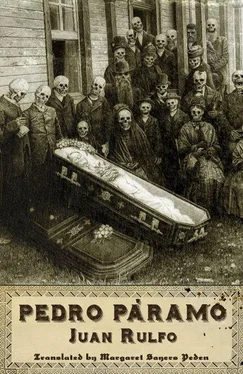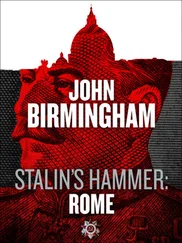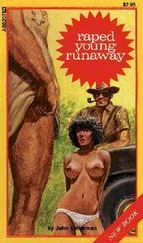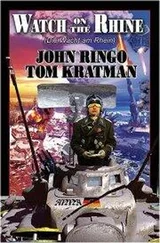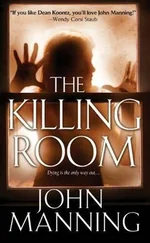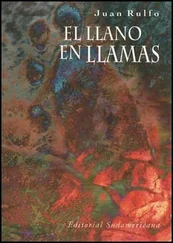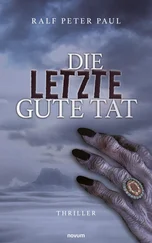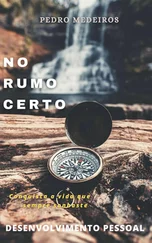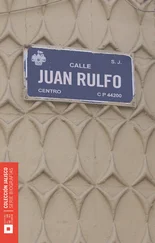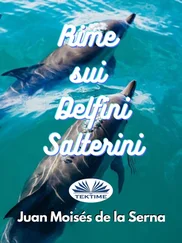“‘No. Not crazy, Miguel. You must be dead. Remember, everyone told you that horse would be the death of you one day. Remember that, Miguel Paramo. Maybe you did do something crazy, but that’s another matter now.’
“‘All I did was jump that new stone fence my father had built. I asked El Colorado to jump it so I wouldn’t have to go all the way around, the way you have to now to get to the road. I know that I jumped it, and then kept on riding. But like I told you, everything was smoke, smoke, smoke.’
“‘Your father’s going to be sick with grief in the morning,’ I told him. ‘I feel sorry for him. Now go, and rest in peace, Miguel. I thank you for coming to say good-bye.’
“And I closed the window. Before dawn, a ranch hand from the Media Luna came to tell me, ‘The patron is asking for you. Young Miguel is dead. Don Pedro wants your company.’
“‘I already knew,’ I told him. ‘Did they tell you to cry?’ “’Yes. Don Fulgor told me to cry when I told you.’ “’All right. You tell don Pedro that I’ll be there. How long ago did they bring him back?’
“‘No more than half an hour. If it’d been sooner, maybe they could of saved him.
Although the doctor who looked him over said he had been cold for some time. We learned about it when El Colorado came home with an empty saddle and made such a stir that no one could sleep. You know how him and that horse loved one another, and as for me, I think the animal is suffering more than don Pedro. He hasn’t eaten or slept, and all he does is chase around in circles. Like he knows, you know? Like he feels all broken and chewed up inside.’
“‘Don’t forget to close the door as you go.’
“And with that the hand from the Media Luna left.”
“Have you ever heard the moan of a dead man?” she asked me.
“No, dona Eduviges.”
“You’re lucky.”
Drops are falling steadily on the stone trough. The air carries the sound of the clear water escaping the stone and falling into the storage urn. He is conscious of sounds: feet scraping the ground, back and forth, back and forth. The endless dripping. The urn overflows, spilling water onto the wet earth.
“Wake up,” someone is saying.
He hears the sound of the voice. He tries to identify it, but he sinks back down and drowses again, crushed by the weight of sleep. Hands tug at the covers; he snuggles beneath their warmth, seeking peace.
“Wake up!” Again someone is calling.
That someone is shaking his shoulders. Making him sit up. He half opens his eyes. Again he hears the dripping of water falling from the stone into the brimming urn. And those shuffling footsteps… And weeping.
Then he heard the weeping. That was what woke him: a soft but penetrating weeping that because it was so delicate was able to slip through the mesh of sleep and reach the place where his fear lived.
Slowly he got out of bed; he saw a woman’s face resting against a doorframe still darkened by night. The woman was sobbing.
“Why are you crying, mama?” he asked; the minute his feet touched the floor he recognized his mother’s face.
“Your father is dead,” she said.
And then, as if her coiled grief had suddenly burst free, she turned and turned in a tight circle until hands grasped her shoulders and stopped the spiraling of her tortured body.
Through the door he could see the dawn. There were no stars. Only a leaden gray sky still untouched by the rays of the sun. A drab light that seemed more like the onset of night than the beginning of day.
Outside in the patio, the footsteps, like people wandering in circles. Muted sounds. And inside, the woman standing in the doorway, her body impeding the arrival of day: through her arms he glimpsed pieces of sky and, beneath her feet, trickles of light. A damp light, as if the floor beneath the woman were flooded with tears. And then the sobbing. Again the soft but penetrating weeping, and the grief contorting her body with pain.
“They’ve killed your father.”
And you, Mother? Who killed you?
There is wind and sun, and there are clouds. High above, blue sky, and beyond that there may be songs; perhaps sweeter voices…. In a word, hope. There is hope for us, hope to ease our sorrows.
“But not for you, Miguel Paramo, for you died without forgiveness and you will never know God’s grace.”
Father Renteria walked around the corpse, reciting the mass for the dead. He hurried in order to finish quickly, and he left without offering the final benediction to the people who filled the church.
“Father, we want you to bless him!”
“No,” he said, shaking his head emphatically. “I won’t give my blessing. He was an evil man, and he shall not enter the Kingdom of Heaven. God will not smile on me if I intercede for him.”
As he spoke, he clasped his hands tightly, hoping to conceal their trembling. To no avail.
That corpse weighed heavily on the soul of everyone present. It lay on a dais in the Center of the church, surrounded with new candles and flowers; a father stood there, alone, waiting for the mass to end.
Father Renteria walked past Pedro Paramo, trying not to brush against him. He raised the aspergillum gently, sprinkling holy water from the top of the coffin to the bottom, while a murmur issued from his lips that might have been a prayer. Then he knelt, and everyone knelt with him:
“Oh, God, have mercy on this Your servant.”
“May he rest in peace, Amen,” the voices chorused.
Then, as his rage was building anew, he saw that everyone was leaving the church, and that they were carrying out the body of Miguel Paramo.
Pedro Paramo approached him and knelt beside him:
“I know you hated him, Father. And with reason. Rumor has it that your brother was murdered by my son, and you believe that your niece Ana was raped by him. Then there were his insults, and his lack of respect. Those are all reasons anyone could understand.
But forget all that now, Father. Weigh him and forgive him, as perhaps God has forgiven him.”
He placed a handful of gold coins on the prie-dieu and got to his feet: “Take this as a gift for your church.”
The church was empty now. Two men stood in the doorway, waiting for Pedro Paramo.
He joined them, and together they followed the coffin that had been waiting for them, resting on the shoulders of four foremen from the Media Luna. Father Renteria picked up the coins, one by one, and walked to the altar.
“These are Yours,” he said. “He can afford to buy salvation. Only you know whether this is the price. As for me, Lord, I throw myself at your feet to ask for the justice or injustice that any of us may ask… For my part, I hope you damn him to hell.”
And he closed the chapel.
He walked to the sacristy, threw himself into a corner, and sat there weeping with grief and sorrow until his tears were exhausted.
“All right, Lord. You win,” he said.
At suppertime, he drank his hot chocolate as he did every night. He felt calm.
“So, Anita. Do you know who was buried today?”
“No, Uncle.”
“You remember Miguel Paramo?”
“Yes, Uncle.”
“Well, that’s who.”
Ana hung her head.
“You are sure he was the one, aren’t you?”
“I’m not positive, Uncle. No. I never saw his face. He surprised me at night, and it was dark.”
“Then how did you know it was Miguel Paramo?”
“Because he said so: ‘It’s Miguel Paramo, Ana. Don’t be afraid.’ That was what he said.”
“But you knew he was responsible for your father’s death, didn’t you?”
“Yes, Uncle.”
“So what did you do to make him leave?”
“I didn’t do anything.”
The two sat without speaking. They could hear the warm breeze stirring in the myrtle leaves.
Читать дальше
